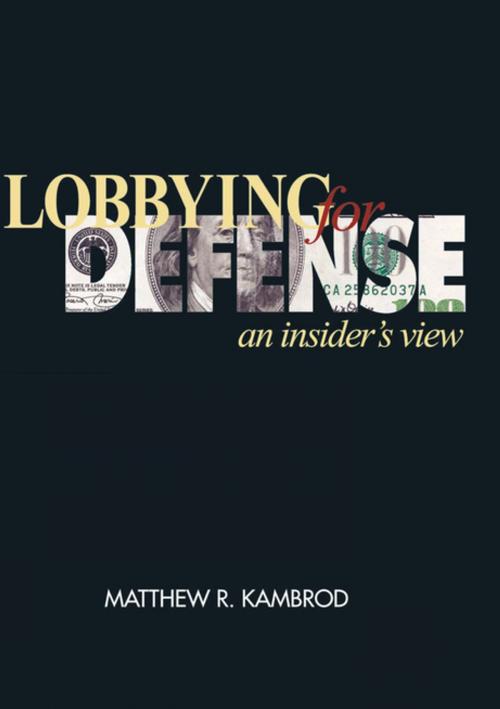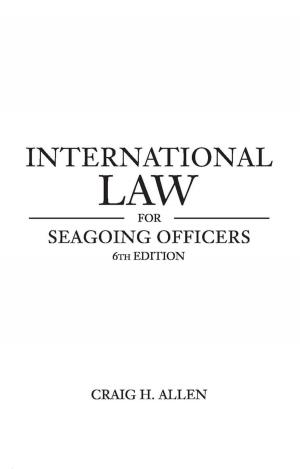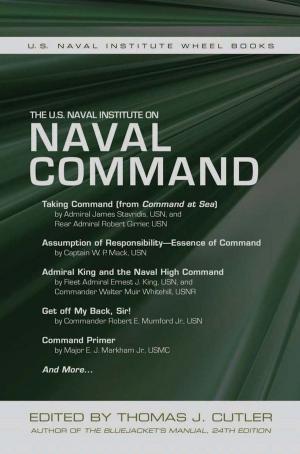| Author: | Matthew R. Kambrod | ISBN: | 9781612514444 |
| Publisher: | Naval Institute Press | Publication: | September 2, 2013 |
| Imprint: | Naval Institute Press | Language: | English |
| Author: | Matthew R. Kambrod |
| ISBN: | 9781612514444 |
| Publisher: | Naval Institute Press |
| Publication: | September 2, 2013 |
| Imprint: | Naval Institute Press |
| Language: | English |
This one-of-a-kind user's guide to successful lobbying for defense appropriation draws on Matthew R. Kambrod's forty-plus years of experience both in the Pentagon as a military officer and on Capitol Hill as a lobbyist. The book presents step-by-step instructions for the lobbyist along with detailed information that only someone with the author's background could provide. He understands how the system works and shows how, when lobbying is conducted within the boundaries of propriety, the process can efficiently benefit lawmakers and defense officials as well as industry.
A former Deputy for Aviation to the Assistant Secretary of the Army for Research, Development, and Acquisition and a current lobbyist for the defense industry, Colonel Kambrod leads the reader through the annual lobbying process, explaining how the armed services establish their requirements for defense programs and how the annual budget is formulated. He also addresses the all-important distinction between "funded" and "unfunded" requirements; defines the roles played by the military, industry, and Congress; and lists the steps to be taken to develop arguments in the pursuit of congressional funding. Topics of general interest, such as campaign contributions, abuse of power, and possible lobbying reforms, are included along with a practical list of lessons learned and an appendix filled with samples of useful documents.
In demystifying the process of lobbying for defense dollars, the author provides an essential tool for everyone interested in the subject both lobbyists and all those who must interact with them.
A former Deputy for Aviation to the Assistant Secretary of the Army for Research, Development, and Acquisition and a current lobbyist for the defense industry, Colonel Kambrod leads the reader through the annual lobbying process, explaining how the armed services establish their requirements for defense programs and how the annual budget is formulated. He also addresses the all-important distinction between "funded" and "unfunded" requirements; defines the roles played by the military, industry, and Congress; and lists the steps to be taken to develop arguments in the pursuit of congressional funding. Topics of general interest, such as campaign contributions, abuse of power, and possible lobbying reforms, are included along with a practical list of lessons learned and an appendix filled with samples of useful documents.
In demystifying the process of lobbying for defense dollars, the author provides an essential tool for everyone interested in the subject both lobbyists and all those who must interact with them.
This one-of-a-kind user's guide to successful lobbying for defense appropriation draws on Matthew R. Kambrod's forty-plus years of experience both in the Pentagon as a military officer and on Capitol Hill as a lobbyist. The book presents step-by-step instructions for the lobbyist along with detailed information that only someone with the author's background could provide. He understands how the system works and shows how, when lobbying is conducted within the boundaries of propriety, the process can efficiently benefit lawmakers and defense officials as well as industry.
A former Deputy for Aviation to the Assistant Secretary of the Army for Research, Development, and Acquisition and a current lobbyist for the defense industry, Colonel Kambrod leads the reader through the annual lobbying process, explaining how the armed services establish their requirements for defense programs and how the annual budget is formulated. He also addresses the all-important distinction between "funded" and "unfunded" requirements; defines the roles played by the military, industry, and Congress; and lists the steps to be taken to develop arguments in the pursuit of congressional funding. Topics of general interest, such as campaign contributions, abuse of power, and possible lobbying reforms, are included along with a practical list of lessons learned and an appendix filled with samples of useful documents.
In demystifying the process of lobbying for defense dollars, the author provides an essential tool for everyone interested in the subject both lobbyists and all those who must interact with them.
A former Deputy for Aviation to the Assistant Secretary of the Army for Research, Development, and Acquisition and a current lobbyist for the defense industry, Colonel Kambrod leads the reader through the annual lobbying process, explaining how the armed services establish their requirements for defense programs and how the annual budget is formulated. He also addresses the all-important distinction between "funded" and "unfunded" requirements; defines the roles played by the military, industry, and Congress; and lists the steps to be taken to develop arguments in the pursuit of congressional funding. Topics of general interest, such as campaign contributions, abuse of power, and possible lobbying reforms, are included along with a practical list of lessons learned and an appendix filled with samples of useful documents.
In demystifying the process of lobbying for defense dollars, the author provides an essential tool for everyone interested in the subject both lobbyists and all those who must interact with them.















